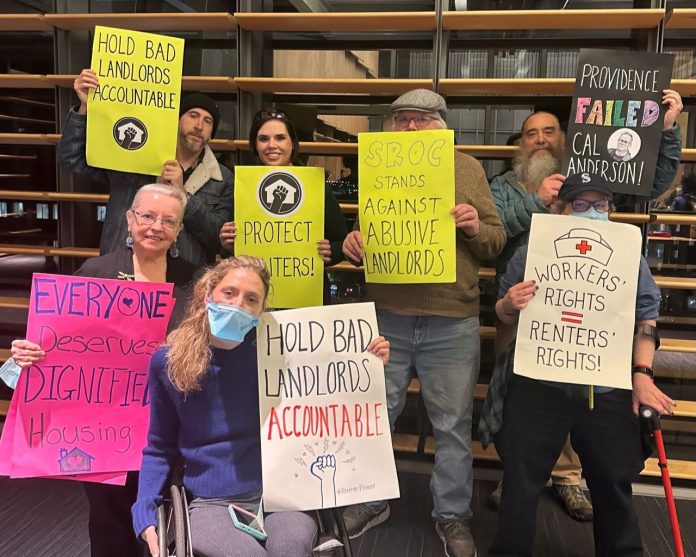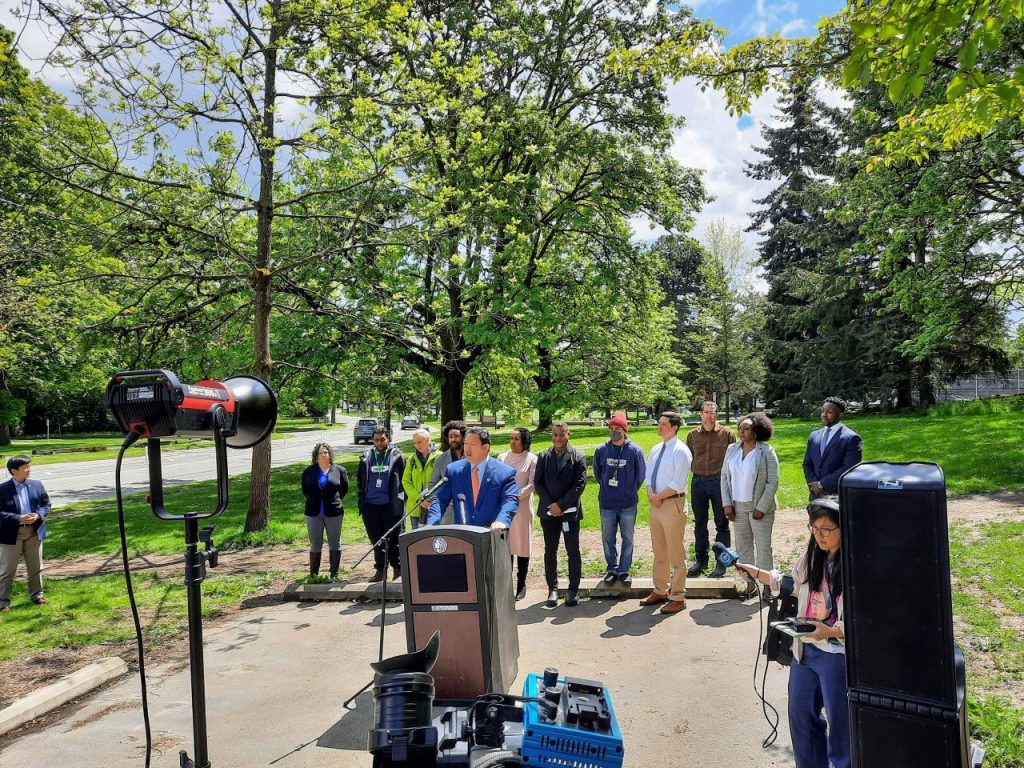
Renters make up more than half Seattle’s population, but they can be a political afterthought. Case in point: Mayor Bruce Harrell has proposed significant cuts to tenant programs, slashing nearly $500,000 in direct rental assistance and $1.3 million in tenant services in his proposed 2025 budget.
Numerous tenant-serving organizations will be hurt by these cuts, including Be:Seattle, Housing Justice Project, Solid Ground, Tenant Law Center, InterIm CDA, and more. These groups play a vital role in providing services such as legal aid, eviction prevention, housing advocacy, and tenant education, as well as fighting for renters’ rights more broadly. They are also members of the Stay Housed, Stay Healthy Coalition, which is fighting to double tenant program funding rather than slash it.
The mayor’s budget cuts funding for tenant counseling, education, casework, and legal services from about $2.5 million to only $1.2 million, the coalition said. Rental assistance would go from about $1 million to only $527,000. The same cuts would apply to the 2026 budget, as well.
Reduced funding will mean reduced capacity to provide services to renters. Many programs focus on residents who are living in unsafe or unhealthy conditions provided by landlords, are at risk of losing their homes, or who have already been evicted. Many clients are vulnerable residents from lower socioeconomic groups, Black, Indigenous, and people of color (BIPOC), as well as immigrant and refugee populations. Some of Seattle’s more vulnerable people will be affected most significantly by these cuts and the accompanying loss of services.
“This is an outright cut, which harms so many different rental assistance programs,” Derek Lum, policy adviser at InterIm CDA, told The Urbanist. “These are people advising tenants on their legal rights and responsibilities related to their housing, advising them on their housing search, and there’s a variety of other things that people do with that money, all with the eye towards stabilizing tenants’ housing, and really helping prevent homelessness.”
The King County Bar Association’s Housing Justice Project is expecting similar challenges and reduced capacity, the group’s managing attorney of Edmund Witter said.
“I’m expecting it could prevent us from helping anywhere from 100 to 500 households,” Witter said
In the context of rising rental prices in Seattle, lagging housing production, and the rapid increase in homeless populations, opponents argue these budget cuts appear unwise at best, and actively damaging at worst. Mayor Harrell has often spoken of a desire to alleviate homelessness in Seattle, but appears to be focused on additional policing, temporary shelters and sweeping of encampments, rather than addressing root causes and prevention services to keep people housed in the first place.

Instead of addressing the root causes of homelessness, the proposed 2025 budget could make people more at risk.
“We will see more homelessness, more displacement, more housing affordability issues, more people becoming extremely rent burdened,” Lum said of the cuts. “And that all represents steps backwards. The public wants progress on these issues. They don’t want to go backwards.”
The proposed 2025 budget also shifts $287 million in funds from the JumpStart payroll tax to make up shortfalls in Seattle’s 2025 budget. The JumpStart payroll tax, also called the Payroll Expense Tax (PET) was originally set up to fund affordable housing, green jobs, and small business assistance, as well as programs designed to reduce inequality. Siphoning that money to plug the budget deficit will decrease affordable housing production and imperil Seattle’s Green New Deal plans, which had been the original legislative intent of the program when it passed in 2020.
JumpStart works by taxing a percentage of the payroll from large companies in Seattle, as these companies can exacerbate inequality by affecting small businesses in the area and attracting higher-paid residents to the area resulting in displacement and gentrification. The JumpStart tax is therefore intended as a displacement prevention measure, seeking to ensure Seattle’s economic boom is shared more widely.
As the tech sector and top salaries have boomed, JumpStart payroll tax revenues have been higher than expected, which Mayor Harrell has sought to use as an excuse to raid those funds to plug holes in the City’s General Fund. The General Fund pays for things like policing, parks, and social services.
The Urbanist reported early in October that along with diversion of JumpStart funds to the General Fund, numerous other cuts were made to city positions and programs. This included programs in the areas of food and meal support, public health, gender-based violence prevention, and community safety. Other budget reductions will affect housing, such as cuts to the Seattle Department of Construction and Inspections (SDCI). In contrast, the Seattle Police Department’s budget is growing by 16%.
Mayor Harrell’s office provided a brief response for a request for comment, noting that the Mayor’s budget proposal includes “a record $342 million in 2025 and $343 million in 2026 to support the construction and acquisition of affordable housing, as well as $3.2 million we are putting forward to keep 300 shelter beds open that were previously funded with one-time federal investments and would have otherwise closed.”
Despite investments in affordable housing and shelter beds, the combination of cuts to tenant services in the proposed 2025 budget, along with reallocation of excess JumpStart funds, leads to the strong possibility that many Seattleites’ housing situation will worsen under the mayor’s new budget. When tenant services are cut, Seattle tenants facing rent hikes or eviction notices on the horizon will be equipped with even fewer tools to handle the fallout. And with Jumpstart thoroughly raided, the city will produce fewer affordable homes to shield tenants from the whims of private sector landlords.
The future budget is also not the only issue at stake. Even previously allocated budgets for affordable housing projects seem to have been discarded. The Seattle Renters Commission (SRC), a public participation board that serves the City of Seattle, has been vocal about $50,000 that was allocated in the 2024 budget to the SDCI, which to date has not yet been released.
This funding was allocated to establish a tenant working group, which had been proposed by the Seattle Renter Organizing Council (SROC), which fights for tenant protections and rights. The tenant working group proposed by SROC was intended to include a new office to enforce and establish renter-related laws and standards. Be:Seattle (which hosts the SROC) is also one of the organizations that will be affected by Mayor Harrell’s proposed 2025 budget cuts. Kate Rubin, organizing director of Be:Seattle, said that Be:Seattle’s funding primarily comes from the city, and that a loss of it could be “catastrophic to the organization’s survival.”
“The way it was written into the budget, the report was supposed to be done by June, and so the funds were supposed to go to the department that was overseeing them right away and they just never got them,” Rubin said. “The deadline has passed and to me, it makes sense that they would just be put back into the budget for 2025. But we are facing a $260 million budget deficit, so it’s going to be a hard fight to convince them to do that.”
As a result of the non-released funding and lack of response from the Mayor’s Office, SRC has been unable to appoint members to the council, and the proposed working group has still not been established. As reported in The Stranger in August this year, “advocates have accused Harrell and the council of skimming off programs, particularly those supported by progressives, to balance their budget without imposing new taxes on the corporate interests that bankrolled their campaigns.”
No response was received to a follow up made by SRC in June, nor to a follow-up in August.
Other groups like InterIm CDA fear that cuts to their services will leave them unable to meet the needs of populations that have specific needs that are harder for other groups to serve. Focusing particularly on immigrant and refugee populations, InterIm CDA provides assistance to renters who need advice in other languages.
While other groups can provide support, Lum said that the language barriers can be a big hurdle.
“When one is an immigrant, a refugee, or they maybe don’t speak English as their first language, they might have seen the material, but they couldn’t read it,” Lum said. “Oftentimes, the very concept of having tenants rights or tenants resources is foreign.”
Without funding, the people that InterIm CDA serves may need to turn elsewhere, to other groups that might not have appropriate language offerings, or may already be overburdened as a result of cuts.
Seattle’s talk about reducing homelessness and improving housing affordability in Seattle does not appear to be backed up by its budget. Howard J. Gale, a local activist for housing rights and against police violence, believes that the city government has a broader pattern of disempowering groups that are led by citizens or people affected by issues on the ground. He sees the lack of funding for the tenant working group proposed by the SROC as one instance of this.
“The city prefers to make its aspirations seem like reality,” Gale told The Urbanist. “If you have the people who are suffering inequalities, whether in housing or in police violence, who are getting a platform to say ‘Wait a minute, it’s not working,’ this destroys the image that you are trying to project.”
Gale is a member of SROC and helped put forward the idea for the renters rights working group.
“One of the reasons Kate and I proposed this renters rights work group, is that I, as a renter, have experienced gross violations in places that I live,” Gale said. “Someone from SDCI came out in August and documented it. I left that building and went to another building. More than 3 months later, I got a call from SDCI asking me if these problems have been resolved. It’s just not good enough.”
Councilmember Cathy Moore has signaled opposition to the rental assistance cuts during Council’s budget proceedings and her office shared a statement noting her intention to take action to support Seattle’s tenants.
“I intend to advocate for more rental assistance and rental arrears funding as well as looking at how to more effectively provide assistance before people incur rent arrears,” Moore said. “We continue to face a housing and affordability crisis in our neighborhoods and it’s important we provide at-risk individuals and families the appropriate tools to stay housed.”

Councilmember Tammy Morales has also been a strident voice for tenant rights, but it’s not clear if she and Moore will have enough votes among their colleagues to get an amendment passed increasing tenant services funding.
The Council will hold a final vote on the proposed 2025 budget this year on November 21. Between now and then, tenant advocates hope that pushback against the budget proposal will win a restoration of funding — if not a doubling of tenant assistance.
“I’m hoping that city councilors will hear this strong advocacy and to fill in the needs in the tenant services budget,” Lum said. “I’d love to be positively surprised.”
Leah Hudson is an editor and writer published by Insider, Atlas Obscura, and Penguin Random House New Zealand. Leah loves to write about sustainable urban development, mental health, and matters of the heart. She spends her time reading, walking her dog, and eating unreasonable amounts of chocolate. You can find her at https://leahhudsonleva.com/.


